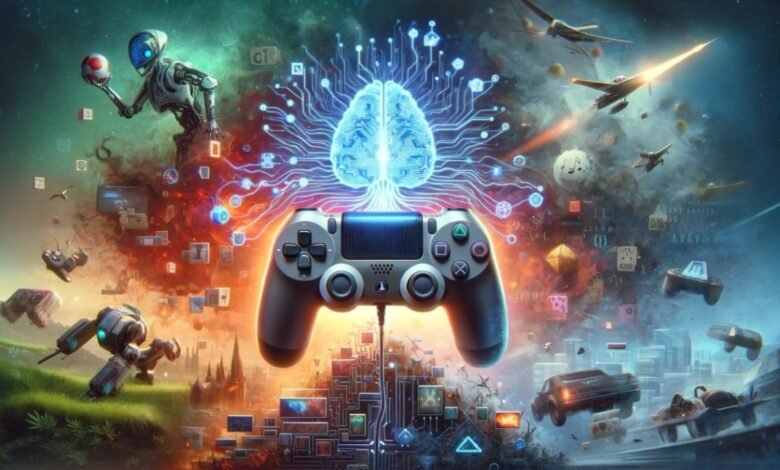The Role of AI in Modern Game Development

Introduction to AI in Gaming
The gaming industry has witnessed a dramatic transformation over the past few decades, largely driven by technological advancements. Among these innovations, artificial intelligence (AI) stands out as a pivotal force shaping the way games are developed, played, and experienced. From enhancing the realism of non-player characters (NPCs) to optimizing game design and personalizing player experiences, AI plays a multifaceted role that transcends mere automation. As developers seek to create increasingly engaging and immersive gaming environments, understanding the role of AI in modern game development becomes essential for both industry professionals and avid gamers alike.
Enhancing Game Design and Development Processes
AI’s influence on game development begins long before the first line of code is written or the initial assets are created. In the early stages of development, AI algorithms assist designers in generating content more efficiently and creatively. Procedural generation, a technique where algorithms create game environments, levels, and assets dynamically, allows developers to create vast, intricate worlds without the need for exhaustive manual design. Games like “No Man’s Sky” and “Minecraft” utilize procedural generation to offer players expansive universes filled with unique landscapes, ensuring that exploration feels fresh and rewarding.
Moreover, AI-powered tools can analyze player data to help developers make informed decisions about game mechanics and narratives. By examining player behavior, preferences, and feedback, AI can identify patterns that guide developers in refining gameplay elements. For instance, if a significant portion of players struggles with a specific level or mechanic, AI can suggest adjustments to improve accessibility and enhance the overall experience. This data-driven approach not only streamlines the development process but also results in games that are more attuned to player expectations.
Intelligent NPCs and Dynamic Interactions
One of the most recognizable applications of AI in gaming is the development of intelligent NPCs. Traditionally, NPCs followed simple scripts, reacting to player actions in predictable ways. However, modern AI techniques, such as machine learning and behavior trees, allow NPCs to exhibit more complex and realistic behaviors. This evolution enhances the immersion and challenge of gameplay, as players encounter characters that can adapt their strategies, learn from interactions, and even exhibit emotions.
For example, in games like “The Last of Us Part II,” NPCs are designed with sophisticated AI that enables them to react dynamically to the player’s actions. They can communicate with one another, strategize in combat, and display emotional responses to situations, creating a more lifelike and engaging experience. This depth of interaction not only enriches storytelling but also elevates gameplay by introducing unpredictability and realism. As AI continues to advance, the potential for creating NPCs that can learn and evolve alongside players presents exciting possibilities for future game narratives.
Personalization of Player Experiences
AI’s capability to analyze large datasets also extends to personalizing player experiences. By collecting and processing data on individual player behaviors, preferences, and skill levels, developers can tailor gameplay to meet the unique needs of each user. This personalization can manifest in various ways, such as adaptive difficulty levels, customized content recommendations, and even unique storylines based on player choices.
Games like “Forza Horizon 5” utilize AI to adapt challenges to individual players, ensuring that the experience remains engaging regardless of skill level. Whether a player is a novice seeking a more relaxed experience or a seasoned gamer looking for intense challenges, AI can dynamically adjust the game to keep them invested. Furthermore, personalized recommendations for in-game purchases, quests, and events enhance player engagement, fostering a deeper connection to the game world.
AI in Game Testing and Quality Assurance
Game testing is an essential phase of game development, ensuring that the final product is polished and free of bugs. Traditionally, this process involved extensive manual testing, which could be time-consuming and prone to human error. However, AI is revolutionizing game testing by automating various aspects of quality assurance. AI algorithms can simulate player behavior, identifying bugs and inconsistencies more efficiently than human testers.
For example, AI can execute thousands of test scenarios in a fraction of the time it would take a human team. It can also analyze vast amounts of data to identify recurring issues, allowing developers to address problems before the game reaches the market. This not only speeds up the testing process but also contributes to the overall quality of the final product. As AI continues to evolve, its role in game testing will likely expand, enabling developers to deliver more refined and enjoyable gaming experiences.
AI and Procedural Storytelling
Beyond enhancing gameplay mechanics and NPC behavior, AI is making strides in the realm of storytelling within games. Procedural storytelling leverages AI to generate narratives that adapt to player choices, creating unique experiences for each playthrough. This approach challenges the traditional linear narrative structures, offering players a sense of agency and influence over the story’s outcome.
Games like “AI Dungeon” showcase the potential of AI-driven storytelling by allowing players to input any scenario, which the AI then expands into a cohesive narrative. This kind of dynamic storytelling not only enhances replayability but also engages players in a more profound manner, as their choices significantly shape the storyline. As developers continue to explore this innovative approach, we can expect a new wave of games that prioritize player-driven narratives, enriching the overall gaming experience.
Ethical Considerations in AI-Driven Games
As AI becomes increasingly integral to game development, ethical considerations surrounding its use must also be addressed. The implementation of AI can raise concerns about data privacy, algorithmic bias, and the potential for manipulation in player engagement. Developers must navigate these challenges to ensure that AI enhances the gaming experience without compromising player trust or safety.
Data privacy is a significant issue, especially as games collect vast amounts of information on player behavior. Developers need to be transparent about data collection practices and prioritize user consent. Additionally, ensuring that AI algorithms do not perpetuate biases—whether in NPC behavior or game mechanics—is crucial for fostering an inclusive gaming environment. The challenge lies in balancing innovation with ethical responsibility, ensuring that AI enhances the gaming experience without infringing on player rights.
The Future of AI in Game Development
Looking ahead, the role of AI in game development is poised to expand further, driven by advancements in technology and a deeper understanding of player engagement. As machine learning algorithms become more sophisticated, we can anticipate even more realistic NPC behaviors, immersive environments, and personalized experiences. Moreover, the integration of AI with emerging technologies, such as virtual reality (VR) and augmented reality (AR), will open new avenues for gameplay and storytelling.
The potential for AI to create responsive, adaptive worlds where players’ choices directly impact not just the narrative but the game environment itself is an exciting prospect. Furthermore, as developers continue to explore the intersection of AI and creativity, we may see innovations that redefine traditional gaming genres and experiences.
Conclusion
In summary, AI is undeniably reshaping the landscape of modern game development, influencing everything from design processes to player interactions and storytelling. Its ability to enhance realism, streamline development, and personalize experiences is transforming how games are created and played. As the gaming industry continues to evolve, the integration of AI will likely deepen, paving the way for more innovative, engaging, and immersive gaming experiences. Understanding the role of AI not only enriches our appreciation of modern games but also highlights the exciting possibilities that lie ahead for both developers and players in this dynamic and rapidly advancing field.



